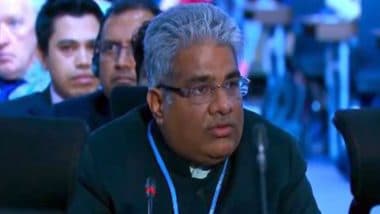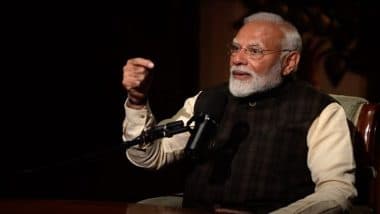New Delhi, March 25: Union Minister for Environment, Forest and Climate Change, Bhupender Yadav said that Project Cheetah is in line with Prime Minister Narendra Modi's commitment to environmental protection and wildlife conservation.
Yadav expressed his gratitude for the steps taken by the Government of India for bringing the cheetah back to India and restoring its lost glory, at the meeting of the Consultative Committee of Parliament on Project Cheetah, chaired by the Union Minister on Friday. He said that this will lead to enhanced livelihood opportunities for the local communities through eco-development and ecotourism activities. Cheetah Reintroduction Programme: Another Feather Added to India's Wildlife Conservation Efforts After Release of 12 Cheetahs, Know Interesting Facts About Big Cats Here (Watch Video).
As per the Ministry of Environment, Forest and Climate Change," the Consultative Committee held detailed discussions about Project Cheetah and appreciated the efforts of the Government for successful translocation of cheetahs in India from African countries.
"Further, the Members of Parliament flagged issues related to forest and wildlife in their constituencies and the issues which have larger interest for the society and wildlife conservation" the ministry added.
Union Minister Bhupendra Yadav thanked the members of the committee for their suggestions and assured the Committee that all the issues raised would be addressed in the right earnest. He stated that the government is determined to conserve wildlife and the environment with the active participation of all stakeholders.
The cheetahs were declared extinct from India in 1952 but recently 8 cheetahs (5 females and 3 males) were brought from Africa's Namibia as part of 'Project Cheetah' and the government's efforts to revitalize and diversify the country's wildlife and habitat. Cheetah Reintroduction Programme: MP CM Shivraj Singh Chouhan, Narendra Singh Tomar Release Second Batch of 12 Cheetahs in Kuno National Park (Watch Video).
The eight cheetahs were brought in a cargo aircraft in Gwalior as part of an inter-continental cheetah translocation project. Later, the Indian Air Force choppers carried the cheetahs to Kuno National Park from Gwalior Air Force Station. The cheetahs have been brought under an MoU signed earlier this year.
Cheetahs will help in the restoration of open forest and grassland ecosystems in India and will help conserve biodiversity and enhance the ecosystem services like water security, carbon sequestration, and soil moisture conservation.
Under the ambitious Project Cheetah of the Indian government, the reintroduction of wild species particularly cheetahs was undertaken as per the International Union for Conservation of Nature (IUCN) guidelines.
India has a long history of wildlife conservation. One of the most successful wildlife conservation ventures 'Project Tiger', which was initiated way back in 1972, has not only contributed to the conservation of tigers but also to the entire ecosystem.
(This is an unedited and auto-generated story from Syndicated News feed, LatestLY Staff may not have modified or edited the content body)













 Quickly
Quickly





















